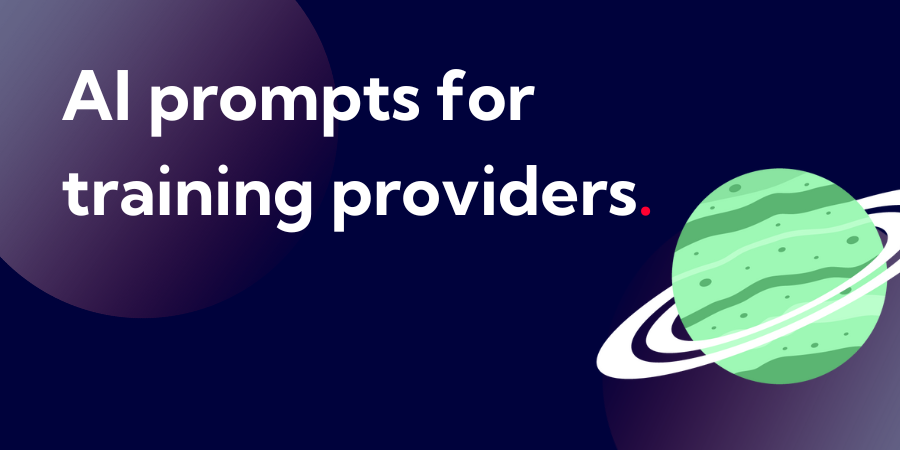36 generative AI prompts for training providers

Generative AI has very quickly become an essential tool for most training companies. From OpenAI beta testing GPT-3 back in 2020, to Google's Gemini launching in 2023, we've seen a huge surge in popularity of a variety of AI tools.
AI is already shaping how training organisations deliver learning, providing both inspiration and practical solutions that make course creation more efficient, engaging, and personalised. It can help trainers and instructional designers save time, curate relevant content, and reach a broader audience. Think of it as a powerful assistant, rather than replacing the role of human educators (for now at least)!
The rise of AI in the training sector is backed by impressive statistics. According to recent reports, the AI in education market is expected to grow from $3.99 billion in 2023 to over $21.13 billion by 2028, a clear indication that the adoption of AI-powered tools in learning is gaining momentum.
From general-purpose AI platforms like ChatGPT to specialised training tools such as Articulate and LearnUpon, AI is helping to streamline processes, automate routine tasks, and provide data-driven insights that shape more effective learning experiences.
In this article, we cover an extensive list of different scenarios in which you may find generative AI useful as a training provider. Whether it's course creation, summarising documents, or post-course surveys; we have it covered. We've also included a few tips to consider, highlighting the advantages of embracing AI-assisted learning and the importance of keeping human expertise at the heart of content creation.
AI prompts for training providers
Here are some effective AI prompts that cater to different aspects of training and development, including content creation, course development, and learner engagement.
Course development & design AI prompts
Instructional design
- "Create a detailed outline for a beginner's course on [topic]. Include objectives, lesson titles, key concepts, and suggested activities."
- "Develop a 5-module e-learning course for [target audience] on [topic], focusing on practical skills and real-world applications."
- "Design a curriculum for [topic] using the ADDIE model (Analyse, Design, Develop, Implement, Evaluate). Include a brief description for each phase."
Engaging training materials
- "Write an engaging script for a training video on [topic], targeting [audience]. The tone should be [formal/informal], and include 3 key takeaways."
- "Create a series of five interactive quiz questions on [topic] that test the learner’s understanding while providing feedback."
- "Develop a case study example for a course on [topic]. It should illustrate a real-world challenge and guide learners through the decision-making process."
Resource summarisation
- "Summarise the key points of [document/article on topic] in a clear and concise paragraph for use in a training module."
- "Generate a summary of a webinar on [topic], focusing on the main takeaways and practical advice shared."
Content rewriting & adaptation
- "Rewrite this technical article on [topic] for a beginner-level audience while maintaining accuracy and key points."
- "Adapt this training content on [topic] for a remote audience, emphasising self-paced learning and digital resources."
Personalisation & customisation
- "Create a personalised learning path for a professional in [industry] who wants to advance their skills in [topic]. Include recommended courses, articles, and projects."
- "Develop a tailored content recommendation for a learner who is struggling with [specific topic]. Include bite-sized content, interactive elements, and key resources."
AI prompts for learner engagement & interaction
Scenario-based learning
- "Write a realistic scenario for a training exercise on [topic] that challenges learners to make a decision. Include multiple choices and feedback for each decision."
- "Create a branching narrative for a training module on [topic] where learners choose their own path based on decisions they make. Outline at least 3 decision points."
Microlearning modules
- "Design a series of microlearning lessons (short, focused content) for [topic]. Each module should be under 5 minutes and focus on a single concept."
- "Generate a checklist for learners to follow after completing a short training on [topic]."
Gamification Elements
- "Develop a leader board or achievement badge system for an online training course on [topic]. List 5 badges and the criteria for earning each one."
- "Create a set of rules for a training-based team challenge on [topic] to increase competition and engagement among participants."
AI prompts for assessment & evaluation content
Knowledge checks & quizzes
- "Create a 10-question assessment for evaluating a learner’s knowledge on [topic]. Use a mix of multiple-choice, true/false, and short-answer questions."
- "Design a pre-test and post-test for a training course on [topic] to measure the learning progress. Include at least 5 questions per test."
Feedback & reflection prompts:
- "Write an end-of-course reflection prompt for learners to think about how they will apply what they’ve learned about [topic]."
- "Develop a peer-review form that allows learners to evaluate each other’s understanding of [topic] in a constructive way."
Practical exercises & role-playing
- "Create a role-play exercise for a training session on [topic] where learners practice [specific skills]. Provide a brief script and context."
- "Design a practical hands-on activity for a workshop on [topic] that encourages learners to work in groups and apply their knowledge."
AI prompts for marketing & promotion of training
Social media posts
- "Generate a series of 5 social media posts to promote a new online course on [topic]. Include a mix of quotes, statistics, and questions to engage followers."
- "Write a compelling LinkedIn post announcing a new training programme on [topic]. Emphasise the benefits and key takeaways for professionals."
Email campaigns
- "Draft a promotional email for an upcoming training session on [topic]. Include the target audience, benefits of attending, and a call-to-action."
- "Create a follow-up email template to send to participants after completing a training course on [topic], including next steps and additional resources."
Website & landing pages
- "Write the content for a landing page advertising a corporate training workshop on [topic]. Include a headline, subheadings, key benefits, and a call-to-action."
- "Develop a FAQ section for a training program’s webpage on [topic]. Address common questions about content, format, pricing, and target audience."
AI prompts for training course content creation based on different learning styles
Visual learners
- "Create a concept map or flowchart to explain [topic] for visual learners."
- "Design a timeline infographic showcasing the history and evolution of [topic] for a training session."
Auditory learners
- "Write a script for a podcast episode discussing [topic] that includes expert interviews and case studies."
- "Create a list of the top 5 podcasts or audiobooks relevant to [topic] that could complement a training course."
Kinaesthetic learners
- "Design a workshop outline with hands-on activities for teaching [topic]. Include step-by-step instructions for a group activity."
- "Create a simulation exercise that allows learners to practice [specific skill] in a controlled environment. Provide instructions and expected outcomes."
Things to consider when using AI for creating training courses
Using generative AI in your training organisation can be great tool for avoiding the dreaded writer's block when creating a new course or feedback survey. However, there are certain factors to consider to ensure effective and responsible use of AI in the training industry. Here's a look at what to keep in mind:
Content quality & accuracy
Especially in more advanced training courses, AI-generated content must always be reviewed by subject matter experts to ensure it is accurate, up-to-date, and contextually relevant. AI can generate general information quickly, but it may lack depth in specialised fields. It may produce factual inaccuracies or misunderstand complex topics, so human oversight is crucial. Use AI to create initial drafts or outlines, and then refine with human expertise for more nuanced and advanced topics.
AI may also struggle with intricacies such as cultural differences, or context-specific examples. Make sure content is reviewed by someone familiar with the audience to ensure relevance and sensitivity.
AI should support, not replace, human involvement in course creation. AI lacks the empathy, intuition, and creativity that human trainers bring. Consider the role of human instructors in areas like mentoring, feedback, and facilitating discussions to complement AI-generated content. Ensure there's always a human element in final reviews, content delivery, and learner interaction. Use AI for simpler tasks like creating outlines, generating quizzes, or summarising documents before scaling up to more complex course creation.
Ethical considerations & responsible AI use
If a course (or even a trainer) is completely AI generated, or if you're using AI to personalise recommendations within course content for example, it is ethical to clearly disclose this to your learners. Transparency builds trust and helps learners understand the benefits and limitations of AI in their learning journey.
Be mindful of the data you input into AI systems, as some may use it to help their AI models to learn and develop. Ensure you are complying with privacy regulations (like GDPR) when using AI with your company-sensitive or learner data. Do not input anyone's personal or identifying information into AI platforms without a robust privacy and security review.
Conclusion
By carefully considering the constraints and cautions for its use in the training industry, including privacy and accuracy, generative AI can be a great addition to your training arsenal. From course creation, to summarising large pieces of training content; using specific, detailed prompts is a great tool for harnessing the power of AI for creating effective and engaging training.
Want to learn more about accessplanit?
If you're interested in learning about using our powerful tools to grow your training business, why not book a demo with accessplanit today?
Our training management software allows you to forget about admin, automate your processes and free up your time to focus on marketing your training business effectively and growing your success.


.png?width=270&height=170&name=5%20great%20ways%20(3).png)